Schedule
Wednesday, June 8th: Summit
| access_time | 7:45-8:45 |
Breakfast Buffet & Registration
| access_time | 9:00-9:05 |
| people |
Wendy Hanamura
Mitchell Baker |
Welcome

Wendy Hanamura
Internet Archive

Wendy Hanamura
Internet Archive
As the Director of Partnerships at the Internet Archive, Wendy uses her storytelling skills to share the remarkable stories locked in its collections. Previously, as Chief Digital Officer of KCETLink and Link TV, the national nonprofit media network, Wendy led diverse teams producing television series, apps, a semantic platform for global videos, international film contests and documentaries—all in the service of social change. Wendy began her career in journalism at Time magazine. She's reported and produced television content around the world for CBS, World Monitor Television, NHK (Japanese Broadcasting Corporation), and PBS.

Mitchell Baker
Mozilla Foundation & Corp, Executive Chairperson

Mitchell Baker
Mozilla Foundation & Corp, Executive Chairperson
As the leader of the Mozilla Project, Mitchell Baker is responsible for organizing and motivating a massive, worldwide, collective of employees and volunteers who are breathing new life into the Internet with the Firefox Web browser, Firefox OS and other Mozilla products. Mitchell continues her commitment to an open, innovative Web and the infinite possibilities it presents.
| access_time | 9:05-9:45 |
| people |
Vint Cerf
|
Keynote Address: Vint Cerf – "A Web that Archives Itself"
The Internet Archive has started the process of preserving the WWW but there is an opportunity to refine the design of WWW to create a self-archiving, distributed system. I hope to explore some of the desirable properties of such a self-archiving system from the technical perspective but feel compelled to consider business models that make the process sustainable and affordable. This is clearly more than just a technical problem.

Vint Cerf
Google

Vint Cerf
Google
Vinton Gray "Vint" Cerf is an Internet pioneer, who is recognized as one of "the fathers of the Internet” for his co-invention of TCP/IP. His contributions have been acknowledged and lauded, repeatedly, with honorary degrees and awards that include the National Medal of Technology, the Turing Award, the Presidential Medal of Freedom, the Marconi Prize, and membership in the National Academy of Engineering. Cerf has worked for Google as a Vice President and Chief Internet Evangelist since October 2005.
| access_time | 9:45-10:30 |
| people |
Tim Berners-Lee
|
Keynote Address: Tim Berners-Lee – "Re-decentralizing the web - some strategic questions"

Tim Berners-Lee
W3C

Tim Berners-Lee
W3C
Tim Berners-Lee invented the World Wide Web in 1989. He founded and Directs the World Wide Consortium (W3C) the forum for technical development of the Web. He founded the Web Foundation whose mission is that the WWW serves humanity, and co-founded the Open Data Institute in London.
Tim is a long-time defender of rights such as privacy, freedom, Net Neutrality and the openness of the Web.
| access_time | 10:30-10:55 |
Break
| access_time | 10:55-11 |
VIDEO: Neocities – Fun on the Decentralized Web
A short video about how Neocities sites are bringing fun and creativity back to the Web
| access_time | 11-11:15 |
| people |
Brewster Kahle
|
Introduction: Brewster Kahle – "Locking the Web Open – a Call for a New, Decentralized Web"
20 years after the World Wide Web was created, can we now make it better? How can we ensure that our most important values: privacy, free speech, and open access to knowledge are enshrined in the code itself? In a provocative call to action, entrepreneur and Open Internet advocate, Brewster Kahle, challenges us to build a better, decentralized Web based on new distributed technologies. He lays out a path to creating a new Web that is reliable, private, but still fun—in order to lock the Web open for good.

Brewster Kahle
Internet Archive

Brewster Kahle
Internet Archive
A passionate advocate for public Internet access, Brewster Kahle has spent his career intent on a singular focus: providing Universal Access to All Knowledge. He is the founder and Digital Librarian of the Internet Archive, the largest digital library in the world. Since the mid-1980s, Kahle has developed technologies for information discovery, including the Internet’s first publishing system called Wide Area Information Server (WAIS), and Alexa Internet, which helps catalog the Web. Kahle is a member of the Internet Hall of Fame and serves on the boards of the Electronic Frontier Foundation and Public Knowledge.
| access_time | 11:15-Noon |
| people |
Kevin Marks, moderator
Feross Aboukhadijeh David Dias Zooko Wilcox Dr. Gavin Wood |
Panel – Peer to Peer Networks
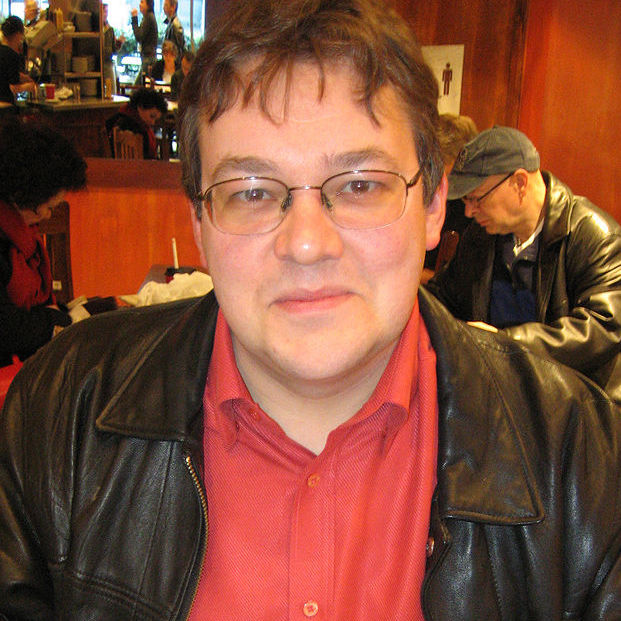
Kevin Marks
Indieweb

Kevin Marks
Indieweb

Feross Aboukhadijeh
WebTorrent

Feross Aboukhadijeh
WebTorrent
Feross is building WebTorrent (webtorrent.io), the first torrent client that works on the web (in the browser. He is bringing P2P to the masses with accessible, WebRTC-based P2P protocols.
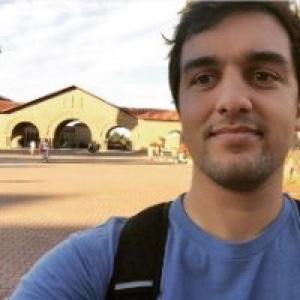
David Dias
Protocol Labs/IPFS

David Dias
Protocol Labs/IPFS
David is a Peer-to-Peer Software Engineer at Protocol Labs. He is building the InterPlanetary File System, which enables the creation of completely distributed applications. He has also contributed to nodesecurity.io and built several modules that enable developers to check for vulnerabilities. He has a Master of Science in Engineering with major in Peer-to-Peer Networks from Technical University of Lisbon.

Zooko Wilcox
Zcash/ Tahoe-LAFS

Zooko Wilcox
Zcash/ Tahoe-LAFS
Zooko has more than 20 years of experience in open, decentralized systems, cryptography and information security, and startups. He is recognized for his work on DigiCash, Mojo Nation, ZRTP, “Zooko's Triangle”, Tahoe-LAFS, BLAKE2, and SPHINCS. He is also the Founder and CEO of Least Authority. He sometimes blogs about health science. He tweets a lot. Zcash is a decentralized and open source cryptocurrency that aims to set a new standard for privacy through the use of groundbreaking cryptography.

Dr. Gavin Wood
Ethereum

Dr. Gavin Wood
Ethereum
Before co-founding Ethcore, Gavin was the CTO and co-founder of the Ethereum Project. He is the co-designer of the Ethereum Protocol, the lead programmer on the C++ Ethereum software client, and was the project chief of the IDE, Solidity programming language, and the Swarm and Whisper protocols. He has pushed the state-of-the-art in video analysis tools and programming languages, as well as co-founding several technology start-ups. Gavin has given seminars and presented to numerous audiences around the world from keynotes at regional technology conferences to musings on the future of legal systems. He coined the terms 'web three' and 'alegality'.
| access_time | 12-12:45 |
| people |
Chelsea Barabas, moderator
Christopher Allen Muneeb Ali Joachim Lohkamp Jeremy Rand |
Panel – Naming & User Identities in Decentralized Networks
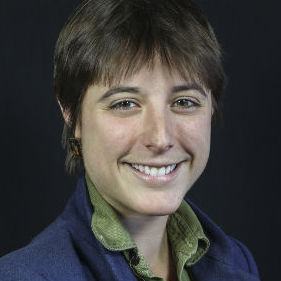
Chelsea Barabas
MIT Media Lab/Center for Civic Media

Chelsea Barabas
MIT Media Lab/Center for Civic Media
Chelsea is the Head of Social Innovation at Digital Currency Initiative at MIT Media Lab, as well as a research assistant at MIT's Center for Civic Media. Chelsea leads the development of collaborations between the MIT research community and other institutions to build blockchain applications that serve the public interest. Previously, she worked on civic technology and international development projects in Africa, South America and the Middle East with a variety of organizations and research institutions including Nuru International.

Christopher Allen
Blockstream

Christopher Allen
Blockstream
Christopher Allen is an entrepreneur, technologist, and educator who specializes in collaboration, security, and trust. As a pioneer in internet cryptography, he’s initiated cross-industry collaborations and created industry standards that influence the entire internet. He worked with Netscape to develop SSL and co-authored the IETF TLS internet draft that is now at the heart of all secure commerce on the World Wide Web. Though he’s worked within numerous privacy and security sectors, Christopher’s recent emphasis has been on engines of trust such as blockchain, smart contracts, and smart signatures, in particular decentralized self-sovereign identity. Christopher has been a digital civil liberties and human-rights privacy advisor, mobile developer, startup consultant, MBA faculty, and social web strategy consultant. He currently is Principle Architect at Blockstream.
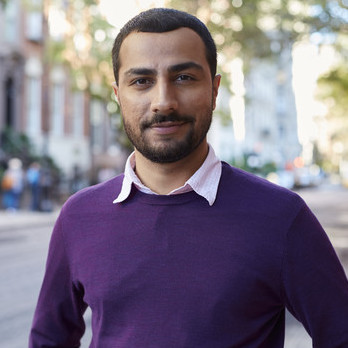
Muneeb Ali
Blockstack

Muneeb Ali
Blockstack
Muneeb Ali is the Co-founder and CTO of Blockstack Labs. Blockstack is an application stack for decentralized, server-less apps secured by the blockchain. Muneeb received his Masters in Computer Science from Princeton University and did PhD-level research in distributed systems at Princeton working in the systems group and at PlanetLab—the world’s first and largest cloud computing testbed. Muneeb was awarded a J. William Fulbright Fellowship and a Princeton Graduate Fellowship. He has built a wide range of production systems and published research papers with over 800 citations.

Joachim Lohkamp
Jolocom/Ouishare

Joachim Lohkamp
Jolocom/Ouishare
Joachim is an entrepreneur and tech enthusiast. He is obsessed with knowledge, change and innovation. Currently, he is Founder and CEO of Jolocom, a Berlin-based startup building decentralized tools that lets you generate your own digital identity to assist linkage and attribution of data. Besides that Joachim is a connector for Ouishare, currently curating the content for the Decentralization & Blockchain track of the next Ouishare Fest in Paris. Also he organizes GETDcent and is an active member of the Agora Collective in Berlin.
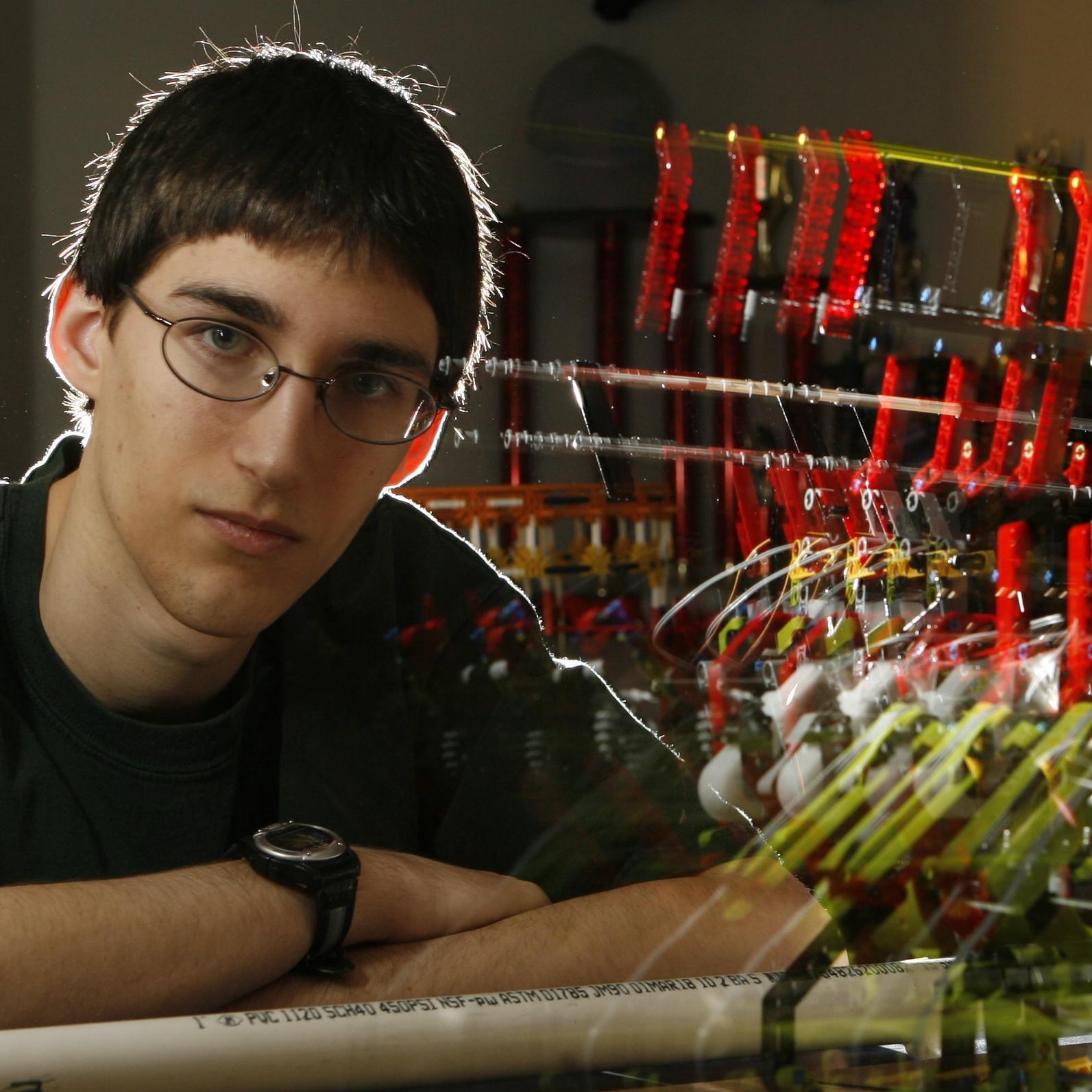
Jeremy Rand
Namecoin

Jeremy Rand
Namecoin
Jeremy is Lead Application Engineer and Community Organizer of Namecoin, a naming system (currently used for DNS and identities) which backs authenticity of records with the same algorithms and code used to back financial transactions in Bitcoin. Jeremy wears many hats at Namecoin but spends much of his time working on applications which enhance online privacy.
| access_time | 12:45-1:45 |
Lunch in foyer, Science Fair outside
30 tables, 30 decentralized technologies in Science Fair.
| access_time | 1:45-1:50 |
Video: Creativity on the Decentralized Web – Scott Draves' Electric Sheep
A short montage of artist Scott Drave's electric sheep--what your computers create while you sleep. A look at what happens when decentralized tech meets artistic genius.
| access_time | 1:50-2:30 |
| people |
Cory Doctorow
|
Keynote: Cory Doctorow – "How Stupid Laws and Benevolent Dictators can Ruin the Decentralized Web, too"
In the last twenty years, we've managed to nearly ruin one of the most functional distributed systems ever created: today's Web. There are many stakeholders being damaged in the process, from individuals to entire nations. To lock open the Web we will need more than code. We will need binding agreements and covenants that enshrine our deepest values. Cory Doctorow shares his vision of what went wrong and how we can get it right – through governance and policies – in the decentralized Web to come.

Cory Doctorow
EFF

Cory Doctorow
EFF
Cory Doctorow (craphound.com) is a science fiction author, activist, journalist and blogger — the co-editor of Boing Boing (boingboing.net) and the author of the YA graphic novel IN REAL LIFE, the nonfiction business book INFORMATION DOESN’T WANT TO BE FREE, and young adult novels like HOMELAND, PIRATE CINEMA and LITTLE BROTHER and novels for adults like RAPTURE OF THE NERDS and MAKERS. He works for the Electronic Frontier Foundation and co-founded the UK Open Rights Group. Born in Toronto, Canada, he now lives in Los Angeles.
| access_time | 2:30-3:15 |
| people |
Amber Case, moderator
Primavera De Filippi Max Ogden Wendy Seltzer Peter Van Garderen |
Panel: As we build a Decentralized Web, what values do we want written in the code?
It's easy as engineers to concentrate on the code and not on those we are building for. What are the values we should be trying to embed in the code? What are the principles we can agree upon about the way this Web should be governed? We hear from the perspectives of an archivist, an engineer, a researcher and an official of the W3C – to see if there is an alignment around values and the ways to express them through technology.

Amber Case
Calm Technology

Amber Case
Calm Technology
Amber Case is a cyborg anthropologist and user experience designer from Portland, Oregon. She studies the interaction between humans and computers and how our relationship with information is changing the way cultures think, act, and understand their worlds. She is the author of An Illustrated Dictionary of Cyborg Anthropology and Calm Technology, as well as the former founder of Geoloqi/Esri.

Primavera De Filippi
Backfeed/COALA

Primavera De Filippi
Backfeed/COALA
Primavera De Filippi is a permanent researcher at the CERSA / CNRS / Université Paris II. She is a faculty associate at the Berkman Center for Internet & Society at Harvard Law School, where she is investigating the concept of governance-by-design as it relates to distributed online architectures, such as Bitcoin, Ethereum, etc. Primavera holds a PhD from the European University Institute in Florence. She is a member of the Global Agenda Council on the Future of Software & IT Services at the World Economic Forum, as well as the founder of the Internet Governance Forum’s dynamic coalitions on Network Neutrality, Platform Responsibility and Blockchain Technology (COALA). In addition to her academic research, Primavera acts as a legal expert for Creative Commons and the P2P Foundation.
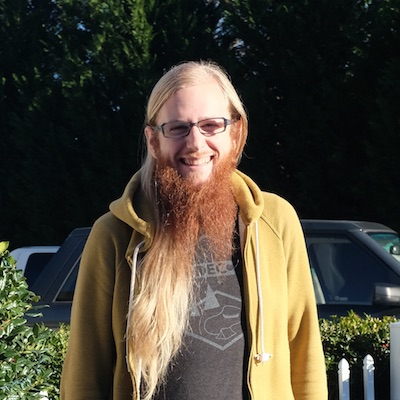
Max Ogden
The Dat Project

Max Ogden
The Dat Project
Max Ogden is a software developer and founder of The Dat Project (http://www.wired.com/2014/08/dat/)">href="http://www.wired.com/2014/08/dat/">http://www.wired.com/2014/08/dat/) a grant funded software development non-profit. Max has lead the Dat team to work with data scientists, journalists and civic technologists to develop better tools for sharing datasets online. Prior to starting the Dat Project, Max was a Code for America fellow.

Wendy Seltzer

Wendy Seltzer
Wendy Seltzer is Policy Counsel to the World Wide Web Consortium (W3C) at MIT, where she leads the Technology & Society Domain's focus on privacy, security, web payments, and social web standards. As a visiting Fellow with Yale Law School's Information Society Project, she researches openness in intellectual property, innovation, privacy, and free expression online.

Peter Van Garderen
Artefactual Systems

Peter Van Garderen
Artefactual Systems
Peter Van Garderen is the founder of Artefactual Systems and the original developer of the open-source Archivematica and AccessToMemory software. These applications are used to manage the preservation and access for hundreds of archival collections worldwide. Peter is a distinguished alumnus of the University of British Columbia's Master of Archival Studies program. He now works as an information management consultant designing electronic records and digital archives architectures http://vangarderen.net. Peter's current research and prototyping interests are in the application of blockchain technologies to recordkeeping workflows and decentralized autonomous collections.
| access_time | 3:15-4 |
| people |
Ross Schulman, moderator
Van Jacobson Mike Perry Paige Peterson Brian Warner |
Panel – Security in a World of Black Hats
There are many "Black Hats" on the world stage today. They have enormous resources, little government oversight, and taps into all the major fiber links. Their goal: to break the security of your code. How can the decentralized technologies represented here fend off their attacks? How would you work around the "Great Firewall of China?" How are you employing this "Black Hat" understanding into your design? We'll pose some provocative security scenarios and discuss how decentralized technologies can combat the most powerful purveyors of censorship, surveillance, and piracy on the world stage. How can builders of a new Web share scenario planning and knowledge to succeed?

Ross Schulman
Open Technology Institute

Ross Schulman
Open Technology Institute
Ross Schulman is a co-director of the Cybersecurity Initiative and senior policy counsel at New America’s Open Technology Institute, where he focuses on cybersecurity, encryption, surveillance, and Internet governance. Prior to joining OTI, Ross worked for Google in Mountain View, California. Ross has also worked at the Computer and Communications Industry Association, the Center for Democracy and Technology, and on Capitol Hill for Senators Wyden and Feingold. Ross earned his juris doctor magna cum laude from Washington College of Law at American University and his bachelor’s degree in computer science from Brandeis University.

Van Jacobson
Google, Named Data Networking Project (NDN)

Van Jacobson
Google, Named Data Networking Project (NDN)
Van Jacobson’s algorithms for the Transmission Control Protocol (TCP) helped solve the problem of congestion and are used in over 90% of Internet hosts today. He is renowned for his pioneering achievements in network performance and scaling. Widely credited with enabling the Internet to expand in size and support increasing speed demands, he helped the Internet survive a major traffic surge (1988-89) without collapsing. - See more at: http://www.internethalloffame.org/inductees/van-jacobson#sthash.iIwDLMAe.dpuf">href="http://www.internethalloffame.org/inductees/van-jacobson#sthash.iIwDLMAe.dpuf">http://www.internethalloffame.org/inductees/van-jacobson#sthash.iIwDLMAe.dpuf

Mike Perry
TOR

Mike Perry
TOR
Mike Perry serves as the Senior Developer dedicated to coordinating technical details between the Tor Browser and Core Tor teams. Mike has done work for The Tor Project for the past 10 years, leading the Tor Browser team for 4 of those years. Mike has also worked on several other areas of Tor, including network path selection, path security, load balancing, and latency improvements. Mike is currently spending time working on padding for traffic analysis, hidden service path selections, and prototypes of new projects that use Tor.
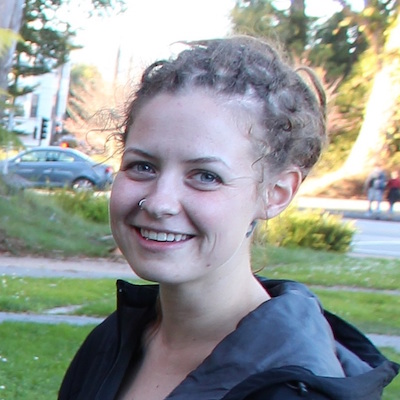
Paige Peterson
MaidSafe

Paige Peterson
MaidSafe
Paige is an advocate for open standards, user privacy and decentralized technologies. She received a BFA practicing experimental art with a strong focus on complexity in nature through interactive installations. Her understanding of natural decentralized systems would map rather eloquently to her growing interest in censorship resistant technologies as she started working for mesh networking startup Open Garden and organizing many bitcoin and cryptocurrency events in San Francisco. In early 2014, Paige met Scotland-based company, MaidSafe who are building a peer-to-peer Internet stemming from similar principles within natural systems which were so attractive to her many years prior and she has been working on various communication efforts full-time with MaidSafe since.

Brian Warner
Tahoe-LAFS

Brian Warner
Tahoe-LAFS
Brian builds Tahoe-LAFS, a distributed storage system that safely uses untrusted servers, and Magic Wormhole, the easiest secure file transfer tool ever.
| access_time | 4-4:25 |
Break
| access_time | 4:25-4:30 |
VIDEO: Enterprise on the Decentralized Web
A look at the entrepreneurs who are using decentralized technologies to devise the next generation of apps and products
| access_time | 4:30-5:15 |
| people |
Wendy Hanamura, moderator
Juan Benet Trent McConaghy Karissa McKelvey Denis Nazarov Evan Schwartz |
Panel – Moonshot Challenge – What could you do to Decentralize Scientific Journal Articles?
In this hands-on panel, we issue a new "moonshot" challenge: How could we take scientific journal literature--which includes code, text, and data--and make it so these articles can be stored, accessed, searched, attributed, and paid for through decentralized systems? How could current technologies work together? What design principles might further this collaboration?

Wendy Hanamura
Internet Archive

Wendy Hanamura
Internet Archive
As the Director of Partnerships at the Internet Archive, Wendy uses her storytelling skills to share the remarkable stories locked in its collections. Previously, as Chief Digital Officer of KCETLink and Link TV, the national nonprofit media network, Wendy led diverse teams producing television series, apps, a semantic platform for global videos, international film contests and documentaries—all in the service of social change. Wendy began her career in journalism at Time magazine. She's reported and produced television content around the world for CBS, World Monitor Television, NHK (Japanese Broadcasting Corporation), and PBS.

Juan Benet
IPFS

Juan Benet
IPFS
Juan Benet created IPFS, Filecoin, and other open source protocols. He is the founder of Protocol Labs, a company improving how the internet works. He studied Computer Science (Distributed Systems) at Stanford University. Juan is obsessed with Knowledge, Science, and Technology.

Trent McConaghy
BigchainDB/ascribe

Trent McConaghy
BigchainDB/ascribe
Trent McConaghy is co-inventor of the world's first planetary-scale blockchain database, BigchainDB, and the creators-first IP service, ascribe. Previously, he worked on AI for designing computer chips to help drive Moore's Law.
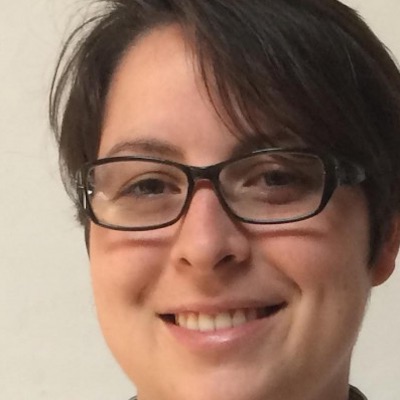
Karissa McKelvey
The Dat Project

Karissa McKelvey
The Dat Project
Karissa McKelvey is a software developer, writer, inventor, and activist supporting an equitable web. Formerly a research scientist at Indiana University, her work studying online political communication resulted in multiple peer-reviewed papers and press in outlets such as NPR and the Wall Street Journal. In addition to an experienced software and web developer, she has successfully led teams to success with diverse projects throughout her career in academia, non-profits, and industry. In her spare time, she teaches beginning programmers, volunteers her time in social movements, and plays the trumpet.

Denis Nazarov
Mediachain

Denis Nazarov
Mediachain
mediachain.io
Denis is a Project Lead at Mediachain — an open data network for creative works--a blockchain-based metadata platform that uses machine learning to turn media into an information transmitter.

Evan Schwartz
Interledger

Evan Schwartz
Interledger
Evan Schwartz is co-inventor of Interledger, the protocol suite for connecting blockchains, payment networks and other digital asset ledgers. Interledger enables payments between parties on different ledgers, meaning developers can build payments into other protocols and apps without being tied to a single payment provider or currency. Interledger is inspired by the designs of IP, TCP, etc and aims to connect the world’s ledgers like the internet protocols connected its information networks.
| access_time | 5:15-5:30 |
| people |
Brewster Kahle
|
Closing Remarks: What happens next?

Brewster Kahle
Internet Archive

Brewster Kahle
Internet Archive
A passionate advocate for public Internet access, Brewster Kahle has spent his career intent on a singular focus: providing Universal Access to All Knowledge. He is the founder and Digital Librarian of the Internet Archive, the largest digital library in the world. Since the mid-1980s, Kahle has developed technologies for information discovery, including the Internet’s first publishing system called Wide Area Information Server (WAIS), and Alexa Internet, which helps catalog the Web. Kahle is a member of the Internet Hall of Fame and serves on the boards of the Electronic Frontier Foundation and Public Knowledge.
| access_time | 5:30-8:00 |
Food trucks and drinks in front of the Archive
Thursday, June 9th: Meetup
On June 9th, the day after the Decentralized Web Summit, we will be hosting a Decentralized Web meetup at the Internet Archive. This meetup is free and open to the public. We will have tables set up for people to meet and hack on decentralized web projects, and have lightning talks scheduled in the Great Room upstairs throughout the day. If you are interested in learning more about the decentralized web or working on related projects with your peers, this is the place to be! Snacks and drinks will be provided.
| access_time | 8:00-9:00 |
Breakfast and networking
| access_time | 9:00-10:30 |
| people |
Lightning Talks
Juan Benet Arkadiy Kukarkin Stefan Thomas Natalie Meyers Jae Kwon Brian Warner Michael Grube Muneeb Ali |
| people |
Workshops
Paige Peterson Christoph Witzany David Dias Joe Perla Joachim Lohkamp |
SESSION A: Lightning Talks and Workshops
Lightning talks in the Greatroom. Facilitated by Primavera De Filippi. Each presenter will give a 5 minute overview, followed by 5 minutes of Q & A.
Workshops: Here's your chance to get some hands-on instruction in the new decentralized protocols and platforms being built today. Each workshop will be 90 minutes.
Workshops: Here's your chance to get some hands-on instruction in the new decentralized protocols and platforms being built today. Each workshop will be 90 minutes.
Lightning Talks

Juan Benet
IPFS
 Juan Benet
IPFS
IPFS is a new transport protocol to make the Web faster, safer, decentralized, and permanent. It is based on git, bittorrent, and other p2p systems. Content-addressed and signed hyperlinks allow the web to be distributed p2p, to work without origin servers, to be encrypted end-to-end, to be censorship resistant, to work offline, and more.
https://ipfs.io
Juan Benet created IPFS, Filecoin, and other open source protocols. He is the founder of Protocol Labs, a company improving how the internet works. He studied Computer Science (Distributed Systems) at Stanford University. Juan is obsessed with Knowledge, Science, and Technology.
|
IPFS is a new transport protocol to make the Web faster, safer, decentralized, and permanent. It is based on git,...
|
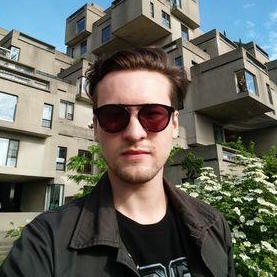
Arkadiy Kukarkin
Mediachain.io
 Arkadiy Kukarkin
Mediachain.io
Mediachain.io
Mediachain is a universal media library.
It connects users directly to creators through content, gives creators a permanent voice wherever their images, songs, videos, films, and writings are shared, and allows us to discover everything about what we're watching, reading, looking at, or listening to, no matter where we find it. Imagine being able to connect with the artist of a viral GIF in your feed or being able to automatically reward songwriters whenever you press play.
Mediachain offers developers protocol stack for collaborating on information about creative works. It includes a decentralized datastore based on IPFS, a collaborative data structure inspired by git, and a content identification technology for canonical ID resolution and perceptual metadata retrieval.
http://mediachain.io
Arkadiy is the CTO of Mediachain Labs, the organization that leads and supports development of the open-source Mediachain project, a universal media library. He previously worked on the music aggregator Hype Machine and on GIS at Foursquare.
|
Mediachain is a universal media library.
It connects users directly to creators through content, gives creators a...
|

Stefan Thomas
Interledger
 Stefan Thomas
Interledger
Interledger is a protocol suite for connecting blockchains, payment networks and other digital asset ledgers. It enables transfers between parties on different ledgers, meaning it can be used to build payments or micropayments into other protocols and apps without being tied to a single payment provider or currency. We will be showing off demos of Interledger in action, walking through how to build it into your projects and how to Interledger-enable your ledger, and discussing how it works under the hood.
Interledger is heavily inspired by the designs of IP, TCP, etc so also come talk to us if you are interested in aspects of the Internet's design to emulate or avoid.
https://interledger.org
Stefan Thomas wants to live in a world where currency moves as frictionlessly as information. As CTO of Ripple, he is helping to build an Internet protocol that does just that. Stefan is one of the co-creators of the Interledger Protocol. The Interledger Protocol is a protocol suite for connecting blockchains and other ledgers. It’s a neutral protocol for payments across different currencies and payment systems.
|
Interledger is a protocol suite for connecting blockchains, payment networks and other digital asset ledgers. It enables...
|

Natalie Meyers
Center for Open Science
 Natalie Meyers
Center for Open Science
cos.io
Center for Open Science (COS) is a non-profit technology company providing free and open services to increase inclusivity and transparency of research. There currently exists a gap between scientific values and scientific practices. COS programs and services bridge the gap and facilitate increased disclosure, transparency, and openness.
Our Open Science Framework http://openscienceframework.org is a free and open infrastructure for engaging with and managing collaborative scientific workflow. Our 1,000,000 Pre-Registration Challenge, TOP Guidelines, badges to acknowledge open Practices, and Reproducibility projects are some of the other ways we are engaging the community and incentivizing open science.
Natalie Meyers is Partnerships and Collaborations Manager at the Center for Open Science.
cos.io
Natalie Meyers is a Partnerships and Collaborations manager at the Center for Open Science (cos.io) during a part-time leave from her faculty role as an E-Research librarian at the University of Notre Dame's Digital Initiatives and Scholarship unit in the Hesburgh Libraries. Natalie devotes a significant part of her time as an embedded data librarian and served as the Vector-Borne Disease Network digital librarian for the past three years. She is a member of senior personnel for the NSF funded Data and Software Preservation for Open Science (daspos.org) project.
|
Center for Open Science (COS) is a non-profit technology company providing free and open services to increase...
|

Jae Kwon
Tendermint
 Jae Kwon
Tendermint
We will release the designs for a novel, suitable architecture for a scalable network of blockchains, powered by Tendermint.
Tendermint is a ""blockchain engine"" that provides provable security for any blockchain. Tendermint is used by ErisIndustries, tested in the R3 consortium, and is gaining adoption by many other upstarts.
Blockchain scalability is an active area of research in the cryptocurrency community. The team behind Tendermint will reveal a novel blockchain network architecture that solves the blockchain scalability problem.
The lightning talk will quickly explain the problem and proposed architecture, and more discussion/Q&A will happen at the workshop session, hopefully with a big whiteboard. A link to a whitepaper will be announced prior to the lightning talk, and copies will be available during the workshop.
See you there!
tendermint.com
Jae Kwon is a blockchain software architect and cofounder of Tendermint. After graduating from Cornell in 2005 with a B.S. degree in computer science, he worked as a professional developer in Silicon Valley, including at Alexa, and at Yelp where he led the mobile application development team. He also cofounded iDoneThis, a productivity service. Jae has worked on numerous open-source projects, including a CoffeeScript compiler/interpreter written in Javascript, an end-to-end encrypted email system called Scramble.io, and a cryptocurrency exchange. These projects were inspired by the cryptopunk hacker ethos, which ultimately led to the current work with Tendermint. Jae has been working on a project he created in 2014, called Tendermint. He invented and refined the Tendermint consensus algorithm with the aim of liberating the blockchain from the costs and drawbacks of proof-of-work mining. His mission is to make this technology more accessible, in order to accelerate the adoption of decentralized ledger technology.
|
We will release the designs for a novel, suitable architecture for a scalable network of blockchains, powered by...
|

Brian Warner
Tahoe-LAFS
 Brian Warner
Tahoe-LAFS
Brian will describe the Tahoe-LAFS project, which is a distributed encrypted storage system aimed at personal backup and small-community file sharing. I'll cover the goals, the use cases, the unique properties, the state of the project, and pointers to learn more.
https://tahoe-lafs.org/
Brian builds Tahoe-LAFS, a distributed storage system that safely uses untrusted servers, and Magic Wormhole, the easiest secure file transfer tool ever.
|
Brian will describe the Tahoe-LAFS project, which is a distributed encrypted storage system aimed at personal backup and...
|

Michael Grube
Freenet
 Michael Grube
Freenet
Freenet 101
Learn how Freenet works from a high level. The basics of the p2p network and data storage.
See how the network supports decentralized websites called freesites.
Discover how it protects your privacy and freedom of expression.
https://freenetproject.org/
Michael Grube is a software developer and volunteer contributor to the Freenet Project. He has investigated scalability and security issues in Freenet's Small World Routing algorithm. He has been involved in other decentralized web projects including SpiderCache, which is a distributed web cache designed for low-bandwidth environments. Currently, he is continuing research on Small World Routing.
|
Freenet 101
Learn how Freenet works from a high level. The basics of the p2p network and data storage.
See how the...
|

Muneeb Ali
Blockstack
 Muneeb Ali
Blockstack
Blockstack is an application stack for decentralized, server-less apps secured by the blockchain. Blockstack provides services for identity, authentication, and storage without relying on any trusted third parties. In this talk and workshop, I'll give a quick overview of how Blockstack works, share lessons from 2+ years of experience of running a production decentralized system, and give a demo of Blockstack's naming and storage.
http://blockstack.org
Muneeb Ali is the Co-founder and CTO of Blockstack Labs. Blockstack is an application stack for decentralized, server-less apps secured by the blockchain. Muneeb received his Masters in Computer Science from Princeton University and did PhD-level research in distributed systems at Princeton working in the systems group and at PlanetLab—the world’s first and largest cloud computing testbed. Muneeb was awarded a J. William Fulbright Fellowship and a Princeton Graduate Fellowship. He has built a wide range of production systems and published research papers with over 800 citations.
|
Blockstack is an application stack for decentralized, server-less apps secured by the blockchain. Blockstack provides...
|
Workshops

Paige Peterson
MaidSafe
 Paige Peterson
MaidSafe
The SAFE Network is a p2p storage and communications network which prioritizes data and user security and privacy. The technology is currently in testing phases before launching an Alpha product and this workshop will go over features from a user experience perspective of logging into the network and uploading personal data, creating an entry in the native DNS system, uploading and publishing a website viewable in any browser. Additionally, this session will cover hosting a vault and touch on some of the key aspects of the infrastructure design which supports data security and user anonymity. If there's time/interest, we can also discuss third-party developer opportunities through the API and review some examples.
http://maidsafe.net
Paige is an advocate for open standards, user privacy and decentralized technologies. She received a BFA practicing experimental art with a strong focus on complexity in nature through interactive installations. Her understanding of natural decentralized systems would map rather eloquently to her growing interest in censorship resistant technologies as she started working for mesh networking startup Open Garden and organizing many bitcoin and cryptocurrency events in San Francisco. In early 2014, Paige met Scotland-based company, MaidSafe who are building a peer-to-peer Internet stemming from similar principles within natural systems which were so attractive to her many years prior and she has been working on various communication efforts full-time with MaidSafe since.
|
The SAFE Network is a p2p storage and communications network which prioritizes data and user security and privacy. The...
|

Christoph Witzany
CloudFleet
 Christoph Witzany
CloudFleet
CloudFleet is a project that wants to make it possible for everyone to have their own personal data center.
Algorithms and data should be under the control of the individuum. To achieve this CloudFleet will create a device that will work as an intelligent assistant, that helps people to communicate securely, collect and analyze their data their data without relying on cloud services.
https://cloudfleet.io
Decentralization Fanatic
Passionate Storyteller Founder of CloudFleet |
CloudFleet is a project that wants to make it possible for everyone to have their own personal data center.
Algorithms...
|

David Dias
Protocol Labs/IPFS
 David Dias
Protocol Labs/IPFS
js-ipfs is IPFS ON THE BROWSER. It's finally here! It is a full implementation of IPFS in javascript, and it works directly on the browser without having to install anything! It can load websites directly from IPFS in javascript, load them end-to-end encrypted and decrypt them directly on the browser, and create real-time dynamic webapps, like peer-to-peer chat!
We will also discuss Orbit, a p2p chat webapp on top of ipfs, and Orbit-db, the CRDT based database it uses.
This workshop will go over:
- js-ipfs motivation and introduction
- js-ipfs demos
- Orbit: full P2P dynamic real-time chat on js-ipfs
- Orbit-db: CRDT based replicated log
- using js-ipfs to build completely distributed webapps
- full mesh conncetivity: js-ipfs meets go-ipfs
https://github.com/ipfs/js-ipfs and https://github.com/haadcode/orbit
David is a Peer-to-Peer Software Engineer at Protocol Labs. He is building the InterPlanetary File System, which enables the creation of completely distributed applications. He has also contributed to nodesecurity.io and built several modules that enable developers to check for vulnerabilities. He has a Master of Science in Engineering with major in Peer-to-Peer Networks from Technical University of Lisbon.
|
js-ipfs is IPFS ON THE BROWSER. It's finally here! It is a full implementation of IPFS in javascript, and it works...
|

Joe Perla
Turntable2.FM
 Joe Perla
Turntable2.FM
Turntable2.FM is a community built clone of a popular music site re-built entirely in javascript, WebRTC, and WebTorrent with no servers. Learn about and help design the next generation of social music listening. Turntable2.FM connects you, your friends and others in a real-time music listening experience. You will learn about the existing architecture, Bring Your Own Signaling Server (BYOSS) anchor serverless design, the Egalitarian Paxos distributed consensus algorithm, and discuss future designs collaboratively.
https://docs.google.com/presentation/d/18dhAhy-K6B2BKf9z2abTQxWPBdY0oalluKOouWk0taQ/edit#slide=id.g144cce8cd1_0_59
Joseph Perla has a degree in computer science from Princeton University, and worked on mobile apps at Facebook and growth at Lyft. He has shipped several Rust cargo libraries, and is currently building and promoting a WebRTC music website.
|
Turntable2.FM is a community built clone of a popular music site re-built entirely in javascript, WebRTC, and WebTorrent...
|

Joachim Lohkamp
Jolocom/Ouishare
 Joachim Lohkamp
Jolocom/Ouishare
Bringing gender equality and ethnic diversity to the decentralized technology community is an important method to fully realise the scope of the revolutionary ideas we're exploring. During the curation of the conference preparation we were already aware of the lack of gender and cultural diversity in the history of the Internet and technology as a whole. We took significant steps to facilitate viewpoints of underrepresented perspectives but it does not end with this conference. We have 25% female speakers during the Decentralised Web Summit but we strongly feel that we need to address this with more passion. In this workshop we like to claim the space for gender equality and ethnic diversity in building the future decentralised and open Internet. Our proposal is to start a working group on this topic during the conference but since we understand that this is the first event of a series of events we hope to establish a plan moving forward as well. There were similar discussions during Ouishare Fest in May with the consensus to create a task force that works on this. We would love to initiate an collaborative effort from actors across networks and communities, including get-d.net blockchainworkshops.org ouishare.net etc.
Joachim is an entrepreneur and tech enthusiast. He is obsessed with knowledge, change and innovation. Currently, he is Founder and CEO of Jolocom, a Berlin-based startup building decentralized tools that lets you generate your own digital identity to assist linkage and attribution of data. Besides that Joachim is a connector for Ouishare, currently curating the content for the Decentralization & Blockchain track of the next Ouishare Fest in Paris. Also he organizes GETDcent and is an active member of the Agora Collective in Berlin.
|
Bringing gender equality and ethnic diversity to the decentralized technology community is an important method to fully...
|
| access_time | 10:30-11:00 a.m. |
Break
| access_time | 11:00-12:30 p.m. |
| people |
Lightning Talks
Matthew Hodgson Lauren Garcia Ryan Barrett Primavera De Filippi Joel Dietz Galen Wolfe-Pauly Tamas Kocsis David Dias Dr. Gavin Wood |
| people |
Workshops
Jae Kwon Evan Schwartz Jeromy Johnson Muneeb Ali Daniel Roberts |
SESSION B: Lightning Talks and Workshops
Lightning talks in the Greatroom. Facilitated by Greg McMullen. Each presenter will give a 5 minute overview, followed by 5 minutes of Q & A.
Workshops: Here's your chance to get some hands-on instruction in the new decentralized protocols and platforms being built today. Each workshop will be 90 minutes.
Workshops: Here's your chance to get some hands-on instruction in the new decentralized protocols and platforms being built today. Each workshop will be 90 minutes.
Lightning Talks

Matthew Hodgson
Matrix
 Matthew Hodgson
Matrix
Matrix.org is a non-profit FOSS project that defines an ecosystem for open decentralised interoperable real-time comms: persisting conversations in distributed Merkel DAGs to ensure they are owned by their participants and never trapped in proprietary silos.
https://matrix.org
|
Matrix.org is a non-profit FOSS project that defines an ecosystem for open decentralised interoperable real-time comms:...
|

Lauren Garcia
LevelNews.org
 Lauren Garcia
LevelNews.org
Media consolidation, technology and Surveillance Capitalism have teamed up on the web to create an Orwellian ecosystem in which journalism as an impactful fourth estate is withering. How did we get here? How have we as technologists contributed to this problem? How can we help journalism get back on track?
http://levelnews.org http://blog.levelnews.org
Lauren Garcia is a software developer whose interest in independent news and frustration with digital distribution systems led her to develop LevelNews.org an independent news aggregator for the open web LevelNews.org is currently live but under construction)
|
Media consolidation, technology and Surveillance Capitalism have teamed up on the web to create an Orwellian ecosystem...
|

Ryan Barrett
IndieWeb
 Ryan Barrett
IndieWeb
Social networking is hugely powerful, but centralized into silos and monocultures. The IndieWeb is a lightweight alternative that lets us do the same things - follow, comment, like, repost, tag people in photos, RSVP to events - between our independent personal web sites, on any CMS or even static site generators. It also interoperates seamlessly with the mainstream social networks.
I'll give a quick intro, a live demo, and answer questions.
http://indiewebcamp.com/
Ryan spent 10 years at Google building infrastructure and co-founded App Engine, and then helped create and launch two startups, first Quip and now Color Genomics. Ryan is here representing the IndieWeb community, where he created and runs brid.gy, a service that syncs your web site with social networks.
|
Social networking is hugely powerful, but centralized into silos and monocultures. The IndieWeb is a lightweight...
|

Primavera De Filippi
Backfeed/COALA
 Primavera De Filippi
Backfeed/COALA
Primavera de Filippi will introduce Backfeed, a decentralized protocol using blockchain technologies to facilitate group collaboration and cooperation, without the need for a centralized authority. At the protocol's core lies a unique peer-to-peer system that evaluates individual contributions made to a community and distributes rewards. Backfeed aims to make launching decentralized applications (DApps) or decentralized collaborative organizations (DCOs) as easy as launching a website is today.
Primavera De Filippi is a permanent researcher at the CERSA / CNRS / Université Paris II. She is a faculty associate at the Berkman Center for Internet & Society at Harvard Law School, where she is investigating the concept of governance-by-design as it relates to distributed online architectures, such as Bitcoin, Ethereum, etc. Primavera holds a PhD from the European University Institute in Florence. She is a member of the Global Agenda Council on the Future of Software & IT Services at the World Economic Forum, as well as the founder of the Internet Governance Forum’s dynamic coalitions on Network Neutrality, Platform Responsibility and Blockchain Technology (COALA). In addition to her academic research, Primavera acts as a legal expert for Creative Commons and the P2P Foundation.
|
Primavera de Filippi will introduce Backfeed, a decentralized protocol using blockchain technologies to facilitate group...
|

Joel Dietz
Decentralized Autonomous Society
 Joel Dietz
Decentralized Autonomous Society
Investigate what is possible in the realm of Decentralized Autonomous Organizations. How can they be used to protect public goods? To protect individual freedoms? To allow distributed interests to protect themselves? To allow new types of economic incentives? Joel Dietz answers all of these questions and more.
Co-founder of the Decentralized Autonomous Society, EtherCasts, and Swarm, Joel Dietz has been one of the earliest members of the Bay Area Ethereum community and greatest pioneers in the realm of decentralized govenrance. The Decentralized Autonomous Society is a distributed thinktank that also has regular meetups in Palo Alto. It has the broad goal of facilitating new types of governance that are made possible via decentralized technologies. It was founded in the early days of Ethereum.
|
Investigate what is possible in the realm of Decentralized Autonomous Organizations. How can they be used to protect...
|

Galen Wolfe-Pauly
Urbit
 Galen Wolfe-Pauly
Urbit
Your Urbit is a personal server: a general-purpose computer built to run your apps, store your data and manage your connected devices. Each Urbit is a part of a global, decentralized network where address space is cryptographic property. You own your Urbit like bitcoin and control it like your PC.
We'll take a very quick tour of the Urbit stack and what it's designed to accomplish in a brief talk. Then, in a workshop, we'll step through some demos: self-hosted publishing and wrangling your existing services with APIs.
http://urbit.org
Galen is a designer, developer and one of the founders of Urbit. Originally trained as an architect (Cooper Union B.Arch 2012), Galen builds tools for people to create, structure and share knowledge.
|
Your Urbit is a personal server: a general-purpose computer built to run your apps, store your data and manage your...
|
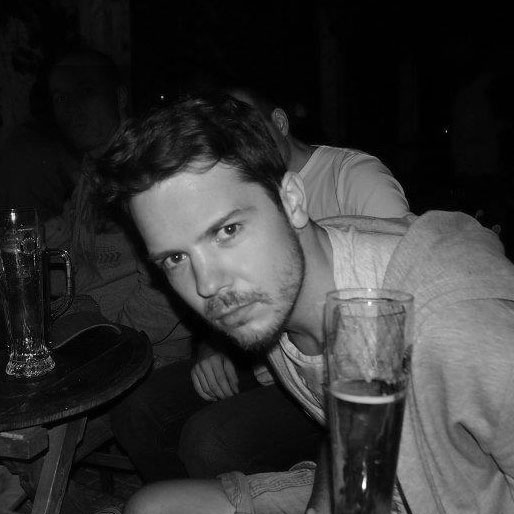
Tamas Kocsis
ZeroNet
 Tamas Kocsis
ZeroNet
ZeroNet allows you to create decentralized, P2P and real-time updated websites using Bitcoin's cryptography and the BitTorrent network.
The project currently offers a P2P synchronized SQL database, anonymity by the Tor network and you can also browse the visited websites without internet connection.
www.zeronet.io
Tamas is a self-taught web builder from Hungary who has been in love with the Internet since the dial-up era. He is the founder and programmer of ZeroNet (https://zeronet.io), which allows you to create decentralized, P2P and real-time updated websites using Bitcoin cryptography and the BitTorrent network.
|
ZeroNet allows you to create decentralized, P2P and real-time updated websites using Bitcoin's cryptography and the...
|

David Dias
Protocol Labs/IPFS
 David Dias
Protocol Labs/IPFS
libp2p is a modular network stack designed to overcome the networking challenges faced by peer-to-peer applications. libp2p is the networking library of IPFS. Many other projects have come together to collaborate on libp2p, as it solves difficult networking challenges for everyone, and creates interoperable protocols.
Our goal at the Decentralized Web Summit is to increase the collaboration between all these peer-to-peer, distributed protocols. libp2p is a fantastic vector for collaboration.
https://github.com/ipfs/specs/blob/master/libp2p/
David is a Peer-to-Peer Software Engineer at Protocol Labs. He is building the InterPlanetary File System, which enables the creation of completely distributed applications. He has also contributed to nodesecurity.io and built several modules that enable developers to check for vulnerabilities. He has a Master of Science in Engineering with major in Peer-to-Peer Networks from Technical University of Lisbon.
|
libp2p is a modular network stack designed to overcome the networking challenges faced by peer-to-peer applications....
|

Dr. Gavin Wood
Ethereum
 Dr. Gavin Wood
Ethereum
Ethcore announced its flagship blockchain technology suite, Parity: a fully compliant Ethereum client built for the IoT/enterprise environment, written in Rust language. Ethcore combines open standards, cutting-edge technologies, the best practices of software development and in-house expertise to create a low-footprint, high-performance, secure and modular technology set: the first in a series of releases which will usher in various optimisations to make the Ethereum protocol more relevant.
https://ethcore.io/parity.html
Before co-founding Ethcore, Gavin was the CTO and co-founder of the Ethereum Project. He is the co-designer of the Ethereum Protocol, the lead programmer on the C++ Ethereum software client, and was the project chief of the IDE, Solidity programming language, and the Swarm and Whisper protocols. He has pushed the state-of-the-art in video analysis tools and programming languages, as well as co-founding several technology start-ups. Gavin has given seminars and presented to numerous audiences around the world from keynotes at regional technology conferences to musings on the future of legal systems. He coined the terms 'web three' and 'alegality'.
|
Ethcore announced its flagship blockchain technology suite, Parity: a fully compliant Ethereum client built for the...
|
Workshops

Jae Kwon
Tendermint
 Jae Kwon
Tendermint
We will release the designs for a novel, suitable architecture for a scalable network of blockchains, powered by Tendermint.
Tendermint is a "blockchain engine" that provides provable security for any blockchain. Tendermint is used by ErisIndustries, tested in the R3 consortium, and is gaining adoption by many other upstarts.
Blockchain scalability is an active area of research in the cryptocurrency community. The team behind Tendermint will reveal a novel blockchain network architecture that solves the blockchain scalability problem.
The lightning talk will quickly explain the problem and proposed architecture, and more discussion/Q&A will happen at the workshop session, hopefully with a big whiteboard. A link to a whitepaper will be announced prior to the lightning talk, and copies will be available during the workshop.
See you there!
tendermint.com
Jae Kwon is a blockchain software architect and cofounder of Tendermint. After graduating from Cornell in 2005 with a B.S. degree in computer science, he worked as a professional developer in Silicon Valley, including at Alexa, and at Yelp where he led the mobile application development team. He also cofounded iDoneThis, a productivity service. Jae has worked on numerous open-source projects, including a CoffeeScript compiler/interpreter written in Javascript, an end-to-end encrypted email system called Scramble.io, and a cryptocurrency exchange. These projects were inspired by the cryptopunk hacker ethos, which ultimately led to the current work with Tendermint. Jae has been working on a project he created in 2014, called Tendermint. He invented and refined the Tendermint consensus algorithm with the aim of liberating the blockchain from the costs and drawbacks of proof-of-work mining. His mission is to make this technology more accessible, in order to accelerate the adoption of decentralized ledger technology.
|
We will release the designs for a novel, suitable architecture for a scalable network of blockchains, powered by...
|

Evan Schwartz
Interledger
 Evan Schwartz
Interledger
Interledger is a protocol suite for connecting blockchains, payment networks and other digital asset ledgers. It enables transfers between parties on different ledgers, meaning it can be used to build payments or micropayments into other protocols and apps without being tied to a single payment provider or currency. We will be showing off demos of Interledger in action, walking through how to build it into your projects and how to Interledger-enable your ledger, and discussing how it works under the hood.
Interledger is heavily inspired by the designs of IP, TCP, etc so also come talk to us if you are interested in aspects of the Internet's design to emulate or avoid.
https://interledger.org
Evan Schwartz, Stefan Thomas
Evan Schwartz is co-inventor of Interledger, the protocol suite for connecting blockchains, payment networks and other digital asset ledgers. Interledger enables payments between parties on different ledgers, meaning developers can build payments into other protocols and apps without being tied to a single payment provider or currency. Interledger is inspired by the designs of IP, TCP, etc and aims to connect the world’s ledgers like the internet protocols connected its information networks.
|
Interledger is a protocol suite for connecting blockchains, payment networks and other digital asset ledgers. It enables...
|
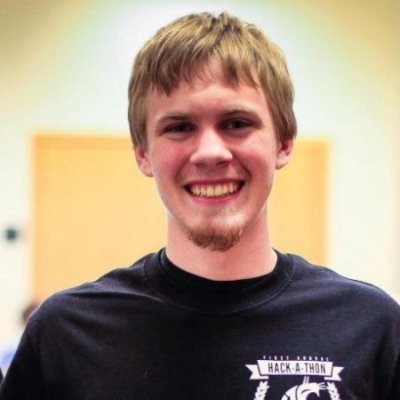
Jeromy Johnson
IPFS
 Jeromy Johnson
IPFS
IPFS Archives and Package Management -- how to use IPFS to version and archive important data.
IPFS was originally created to distribute and verison large scientific datasets. It is designed to make it easy to archive vast amounts of data. This is suitable for efforts like the Internet Archive, as well as many other systems out there. This talk will go over how to create IPFS Archives, existing efforts, Wayback IPFS (an implementation of Wayback Machine with IPFS), and more. It will also discuss Package Managers and the role IPFS can play to make them safer and better.
This workshop will cover:
- Archiving with IPFS
- Wayback IPFS -- an implementation of a Wayback Machine on top of IPFS!
- how to archive things with IPFS
- how to replicate archives peer-to-peer
- how to engage communities in shared archival efforts
- The IPFS Archives effort
- Open Access Scientific Papers and Data
- OpenStreetMap
- Package Managers and IPFS
- discuss package management and IPFS generally
- npm on ipfs
- gx
- others
https://ipfs.io and https://github.com/ipfs/archives
- Jeromy Johnson, Juan Benet
Jeromy is a Peer to Peer Software Engineer at Protocol Labs who goes by whyrusleeping on the internet. He is currently working on IPFS (The Interplanetary FileSystem) to improve the unrestricted flow of data through the decentralized web. Prior to Protocol Labs he worked on distributed filesystems at EMC Isilon and earned a Bachelors Degree with a major in Computer Science at Washington State University.
|
IPFS Archives and Package Management -- how to use IPFS to version and archive important data.
IPFS was originally...
|

Muneeb Ali
Blockstack
 Muneeb Ali
Blockstack
Blockstack is an application stack for decentralized, server-less apps secured by the blockchain. Blockstack provides services for identity, authentication, and storage without relying on any trusted third parties. In this talk and workshop, I'll give a quick overview of how Blockstack works, share lessons from 2+ years of experience of running a production decentralized system, and give a demo of Blockstack's naming and storage.
http://blockstack.org
Muneeb Ali is the Co-founder and CTO of Blockstack Labs. Blockstack is an application stack for decentralized, server-less apps secured by the blockchain. Muneeb received his Masters in Computer Science from Princeton University and did PhD-level research in distributed systems at Princeton working in the systems group and at PlanetLab—the world’s first and largest cloud computing testbed. Muneeb was awarded a J. William Fulbright Fellowship and a Princeton Graduate Fellowship. He has built a wide range of production systems and published research papers with over 800 citations.
|
Blockstack is an application stack for decentralized, server-less apps secured by the blockchain. Blockstack provides...
|

Daniel Roberts
Freenet
 Daniel Roberts
Freenet
Building Decentralized Applications on Freenet
Begins with a brief technical overview of Freenet's different key types.
Learn the uses and limitations of the key types.
Using these static primitives, see how to build interactive applications using the key types provided, using the example of the Freenet Messaging System decentralized forum.
Finally, learn how to utilize the standard WebOfTrust plugin to facilitate spam-resistant, interactive content publishing on Freenet.
https://freenetproject.org/
- Daniel Roberts, Michael Grube
Recent computer science graduate. Long-time advocate of decentralizing technology, particularly Bitcoin and Namecoin. Volunteers with the Freenet Project. Staunch supporter of freedom of expression and commerce, strong interest in decentralized marketplaces.
|
Building Decentralized Applications on Freenet
Begins with a brief technical overview of Freenet's different key...
|
| access_time | 12:30-1:30 p.m. |
Pizzas and salads arrive
| access_time | 1:30-3:00 p.m. |
| people |
Lightning Talks
Jehan Tremback John Light Victor Morrow Feross Aboukhadijeh Samer Hassan Dan Gillmor Paul Frazee Christopher Allen Jeremy Rand |
| people |
Workshops
Juan Benet Matthew Hodgson Primavera De Filippi Denis Nazarov Tamas Kocsis |
SESSION C: Lightning Talks and Workshops
"Lightning talks in the Greatroom. Facilitated by Paige Peterson. Each presenter will give a 5 minute overview, followed by 5 minutes of Q & A.
Workshops: Here's your chance to get some hands-on instruction in the new decentralized protocols and platforms being built today. Each workshop will be 90 minutes."
Workshops: Here's your chance to get some hands-on instruction in the new decentralized protocols and platforms being built today. Each workshop will be 90 minutes."
Lightning Talks

Jehan Tremback
Althea
 Jehan Tremback
Althea
Jehan Tremback is developing Althea, a set of protocols allowing routers on a mesh network to pay each other for bandwidth. This will eliminate the role of centralized ISPs, and lower costs for bandwidth by allowing the network to grow in an organic and decentralized way. Users will load up their devices with cryptocurrency to pay for bandwidth, or install networking equipment on their property to build the network and make some money.
altheamesh.com
Jehan Tremback has been developing blockchain applications for 3 years, starting with a Dogecoin tipbot. He is currently exploring the intersection between blockchains and mesh networks.
|
Jehan Tremback is developing Althea, a set of protocols allowing routers on a mesh network to pay each other for...
|

John Light
Bitseed
 John Light
Bitseed
Bitseed is developing a decentralized web server that can host websites that have been uploaded to the decentralized web. Bitseed owners will be able to earn bitcoin by hosting encrypted copies of other people's data. We are helping to build out the hosting infrastructure of the decentralized web, one Bitseed server at a time. In this talk, we will share the challenges and lessons learned building a personal server for home use.
https://bitseed.org
John Light is a co-founder of Bitseed, author of Bitcoin: Be Your Own Bank, writer at the okTurtles Foundation, free software advocate and contributor, and advisor to cryptocurrency startups and investors. He organized Blockstack Summit NYC in 2015, founded the Buttonwood SF P2P Cryptocurrency Trading meetup in San Francisco, hosts the P2P Connects Us podcast, and is an avid reader and writer on the topics of peer-to-peer technology, philosophy, and culture. You can find John's website and blockchain ID at www.lightco.in
|
Bitseed is developing a decentralized web server that can host websites that have been uploaded to the decentralized...
|

Victor Morrow
Prometheus
 Victor Morrow
Prometheus
Prometheus is a peer-to-peer social network for commerce. We ultimately want to build a community where it is possible to help for a living. We aim to provide a fair currency system that embodies this spirit. We call this currency sparks (-1 seconds). This currency is backed by the time of its users voluntarily and exchanged among each other for goods and services. We provide the means for managing the flow of this currency between users automatically through smart contracts. In addition we provide a commodities market that tracks the price of goods in services traded on the network as financial decision making data for negotiating the price of goods and services. This lays the foundation for a sustainable universal basic income that not only encourages contribution to society but the funding of innovation either indirectly through currency or by direct human effort or contribution. The current non-linear, inflationary economies of the world cannot support this concept. This system monetizes charity as opposed to scarcity of resources. It also meets the criteria of being an Open Value Network. I'd love to share more information in person. The paper detailing the full system or our github wiki can be reached through our website.
http://prometheus.network/
Victor Morrow is a software developer and creator of Prometheus: The Social Currency Network. Prometheus is a P2P Social Network for commerce. By bridging time banking, decentralized autonomous organizations, and smart-contracts, Prometheus hopes to establish universal metric for human value in the form of a sustainable universal basic income system created by currency.
|
Prometheus is a peer-to-peer social network for commerce. We ultimately want to build a community where it is possible...
|

Feross Aboukhadijeh
WebTorrent
 Feross Aboukhadijeh
WebTorrent
WebTorrent -- how to use torrent technology from the web browser
Will show live coding demos about how to use WebTorrent to build amazing demos quickly. Will probably have time for 2-3 quick examples in 5 minutes.
https://webtorrent.io
Feross is building WebTorrent (webtorrent.io), the first torrent client that works on the web (in the browser. He is bringing P2P to the masses with accessible, WebRTC-based P2P protocols.
|
WebTorrent -- how to use torrent technology from the web browser
Will show live coding demos about how to use...
|

Samer Hassan
Berkman Center / P2Pvalue
 Samer Hassan
Berkman Center / P2Pvalue
Building decentralized software is hard. Development frameworks are built thinking in centralized apps, moreover when thinking of collaborative apps. SwellRT is a development framework for building decentralized real-time collaborative apps, very easily and avoiding extra code to the developer. SwellRT provides a server side (storage, sharing, identity, federation) and an API to build apps in JavaScript, Java or Android. Think of Google Drive RT API or Firebase but decentralized & open source.
http://swellrt.org
Samer Hassan (PhD) is an activist and researcher, Fellow at the Berkman Center for Internet & Society (Harvard University) and Assistant Professor at the Universidad Complutense de Madrid (Spain). He has carried out interdisciplinary research in decentralized systems, social simulation and artificial intelligence resulting in 45 publications. He's UCM Principal Investigator in the EU-funded P2Pvalue project on building decentralized software for Commons-based peer production communities.
|
Building decentralized software is hard. Development frameworks are built thinking in centralized apps, moreover when...
|

Dan Gillmor
Author, Tech Journalist
 Dan Gillmor
Author, Tech Journalist
The people in this room understand what is happening. Now we have to explain to the wider public a) what is at stake; and b) what they can do about it, individually and in their communities (of interest and/or geography). What are the best approaches?
permissiontaken.com
Dan Gillmor teaches, writes, and speaks on the development of media and technology. At Arizona State University's Walter Cronkite School of Journalism and Mass Communication, he teaches digital media literacy and promotes entrepreneurship in journalism. He is author of We the Media: Grassroots Journalism by the People, for the People and Mediactive. His upcoming project, entitled Permission Taken, looks at the increasing control that companies and governments are exerting over the way we use technology and communicate, and how we can take back some of that control. Dan writes a regular column for Slate's Future Tense channel, and is a frequent contributor to Medium's Backchannel technology site. He has co-founded, advised, and served on boards at a number of media-related companies and nonprofits, and speaks widely around the world on media and technology topics.
|
The people in this room understand what is happening. Now we have to explain to the wider public a) what is at stake;...
|
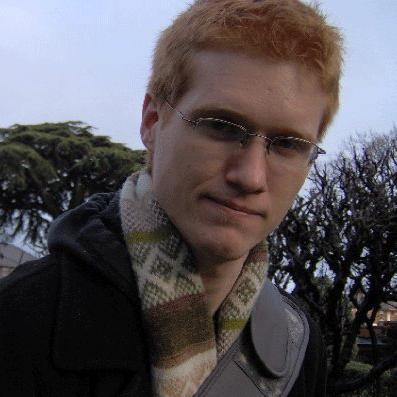
Paul Frazee
Patchwork
 Paul Frazee
Patchwork
Signed merkle logs: What are they, and Why they're so useful in decentralized systems.
Paul Frazee works on decentralized identity, Web-of-Trust, and bringing PGP into the 21st century.
|
Signed merkle logs: What are they, and Why they're so useful in decentralized systems.
|

Christopher Allen
Blockstream
 Christopher Allen
Blockstream
At each Rebooting the Web of Trust event we collaboratively create white papers and specifications on topics that will have the greatest impact on the future of self-sovereign identity. We have 5 white papers from the November event, and we are in progress of releasing more based on May’s event. Our next event is at the end of September.
This lightning talk will briefly summarize our whitepaper topics.
http://www.WebOfTrust.info
Christopher Allen is an entrepreneur, technologist, and educator who specializes in collaboration, security, and trust. As a pioneer in internet cryptography, he’s initiated cross-industry collaborations and created industry standards that influence the entire internet. He worked with Netscape to develop SSL and co-authored the IETF TLS internet draft that is now at the heart of all secure commerce on the World Wide Web. Though he’s worked within numerous privacy and security sectors, Christopher’s recent emphasis has been on engines of trust such as blockchain, smart contracts, and smart signatures, in particular decentralized self-sovereign identity. Christopher has been a digital civil liberties and human-rights privacy advisor, mobile developer, startup consultant, MBA faculty, and social web strategy consultant. He currently is Principle Architect at Blockstream.
|
At each Rebooting the Web of Trust event we collaboratively create white papers and specifications on topics that will...
|

Jeremy Rand
Namecoin
 Jeremy Rand
Namecoin
This workshop will cover how to use Namecoin, including use cases such as registering domain names and attaching an IP address to them, viewing Namecoin websites, registering Namecoin identities, attaching your public keys to your Namecoin identity, and using your Namecoin identity to send messages and log into websites. If we have time, we might also cover buying and selling domain names and identities without counterparty fraud risk.
www.namecoin.org
Jeremy is Lead Application Engineer and Community Organizer of Namecoin, a naming system (currently used for DNS and identities) which backs authenticity of records with the same algorithms and code used to back financial transactions in Bitcoin. Jeremy wears many hats at Namecoin but spends much of his time working on applications which enhance online privacy.
|
This workshop will cover how to use Namecoin, including use cases such as registering domain names and attaching an IP...
|
Workshops

Juan Benet
IPFS
 Juan Benet
IPFS
IPLD is the internal data format for IPFS, Mediachain, uPort, IPDB, and other systems. A large variety of protocols use merkle-linked datastructures (git, bittorrent, ipfs, tahoe-lafs, sfs, etc). IPLD is an interchangeable data format to unify these types of systems. It can represent any merkle-tree or hash-chain data, perfect for peer-to-peer protocols and decentralizing the web.
Our goal at the Summit is to increase the collaboration between all our p2p protocols. IPLD is a fantastic vector for collaboration!
This workshop will cover:
- IPLD Motivation and Intoduction
- IPLD Design
- merkle-links: the core unit of a merkle-graph
- merkle-paths: unix-style paths for traversing merkle-graphs with named merkle-links
- IPLD Data Model: a flexible, JSON-based data model for representing merkle-dags.
- IPLD Serializion: a set of formats in which IPLD objects can be represented, for example JSON, CBOR, CSON, YAML, Protobuf, XML, RDF, etc.
- Concrete IPLD Examples:
- Filesystems
- Version Control Systems
- Blockchains
- Indexing
- Mapping
- How is IPLD used in IPFS and other systems
https://github.com/ipfs/specs/tree/master/ipld
Juan Benet created IPFS, Filecoin, and other open source protocols. He is the founder of Protocol Labs, a company improving how the internet works. He studied Computer Science (Distributed Systems) at Stanford University. Juan is obsessed with Knowledge, Science, and Technology.
|
IPLD is the internal data format for IPFS, Mediachain, uPort, IPDB, and other systems. A large variety of protocols use...
|

Matthew Hodgson
Matrix
 Matthew Hodgson
Matrix
Matrix.org is a non-profit FOSS project that defines an ecosystem for open decentralised interoperable real-time comms: persisting conversations in distributed Merkel DAGs to ensure they are owned by their participants and never trapped in proprietary silos.
We will dig into Matrix's architecture & APIs, demo our clients, bridges, servers & bots, and showcase Vector: the all-new flagship Matrix app (launching June 9) to show that decentralised comms apps with great UX are here and ready today!!
https://matrix.org
|
Matrix.org is a non-profit FOSS project that defines an ecosystem for open decentralised interoperable real-time comms:...
|

Primavera De Filippi
Backfeed/COALA
 Primavera De Filippi
Backfeed/COALA
Primavera de Filippi will introduce Backfeed, a decentralized protocol using blockchain technologies to facilitate group collaboration and cooperation, without the need for a centralized authority. At the protocol's core lies a unique peer-to-peer system that evaluates individual contributions made to a community and distributes rewards. Backfeed aims to make launching decentralized applications (DApps) or decentralized collaborative organizations (DCOs) as easy as launching a website is today.
Primavera De Filippi is a permanent researcher at the CERSA / CNRS / Université Paris II. She is a faculty associate at the Berkman Center for Internet & Society at Harvard Law School, where she is investigating the concept of governance-by-design as it relates to distributed online architectures, such as Bitcoin, Ethereum, etc. Primavera holds a PhD from the European University Institute in Florence. She is a member of the Global Agenda Council on the Future of Software & IT Services at the World Economic Forum, as well as the founder of the Internet Governance Forum’s dynamic coalitions on Network Neutrality, Platform Responsibility and Blockchain Technology (COALA). In addition to her academic research, Primavera acts as a legal expert for Creative Commons and the P2P Foundation.
|
Primavera de Filippi will introduce Backfeed, a decentralized protocol using blockchain technologies to facilitate group...
|

Denis Nazarov
Mediachain
 Denis Nazarov
Mediachain
mediachain.io
Mediachain is a universal media library.
It connects users directly to creators through content, gives creators a permanent voice wherever their images, songs, videos, films, and writings are shared, and allows us to discover everything about what we're watching, reading, looking at, or listening to, no matter where we find it. Imagine being able to connect with the artist of a viral GIF in your feed or being able to automatically reward songwriters whenever you press play.
Mediachain offers developers protocol stack for collaborating on information about creative works. It includes a decentralized datastore based on IPFS, a collaborative data structure inspired by git, and a content identification technology for canonical ID resolution and perceptual metadata retrieval.
http://mediachain.io
Denis is a Project Lead at Mediachain — an open data network for creative works--a blockchain-based metadata platform that uses machine learning to turn media into an information transmitter.
|
Mediachain is a universal media library.
It connects users directly to creators through content, gives creators a...
|

Tamas Kocsis
ZeroNet
 Tamas Kocsis
ZeroNet
ZeroNet allows you to create decentralized, P2P and real-time updated websites using Bitcoin's cryptography and the BitTorrent network. The project currently offers a P2P synchronized SQL database, anonymity by the Tor network and you can also browse the visited websites without internet connection.
https://zeronet.io
Tamas is a self-taught web builder from Hungary who has been in love with the Internet since the dial-up era. He is the founder and programmer of ZeroNet (https://zeronet.io), which allows you to create decentralized, P2P and real-time updated websites using Bitcoin cryptography and the BitTorrent network.
|
ZeroNet allows you to create decentralized, P2P and real-time updated websites using Bitcoin's cryptography and the...
|
| access_time | 3:00-3:30 p.m. |
Break
| access_time | 3:30-5:00 p.m. |
| people |
Lightning Talks
Greg Lindahl Dan Whaley Alberto Granzotto Ben Trask Harlan T Wood Joachim Lohkamp Maira Sutton Zooko Wilcox Mek Karpeles |
| people |
Workshops
Jehan Tremback Feross Aboukhadijeh Joel Dietz David Dias Jeremy Rand |
SESSION D: Lightning Talks and Workshops
Lightning talks in the Greatroom. Facilitated by Kyle Drake. Each presenter will give a 5 minute overview, followed by 5 minutes of Q & A.
Workshops: Here's your chance to get some hands-on instruction in the new decentralized protocols and platforms being built today. Each workshop will be 90 minutes.
Workshops: Here's your chance to get some hands-on instruction in the new decentralized protocols and platforms being built today. Each workshop will be 90 minutes.
Lightning Talks

Greg Lindahl
Internet Archive
 Greg Lindahl
Internet Archive
Ode to Dead Software: Legion
People have been building decentralized software systems for 50+ years. I'll cover a late-1990s effort to build a "metacomputing" system, talking about what did and didn't work out well.
http://legion.virginia.edu/
Greg currently works on search for the Wayback Machine, but caught the distributed computing bug while working on the Legion metacomputing system in the late 1990s. Formerly, he was founder/CTO of a web-scale search engine, which was sold to IBM Watson in 2015. Before that, he was founder/Distinguished Engineer at a supercomputing startup. For fun, he plays a bunch of Renaissance-era musical instruments, and taught himself Italian so that he could reconstruct the dances in 16th century Italian dance manuals.
|
Ode to Dead Software: Legion
People have been building decentralized software systems for 50+ years. I'll cover a...
|

Dan Whaley
Hypothes.is
 Dan Whaley
Hypothes.is
Open annotations are quickly becoming a powerful new collaborative layer over the Web. I'll cover the basic technology, give a quick demo and highlight how its being used and where it's going. In particular, I'll focus on the potential for federation and perhaps eventually decentralization of annotation storage.
hypothes.is
Dan is the founder of Hypothesis. His mission is to bring an open, distributed annotation layer to all knowledge. Dan created the first online travel reservation company on the web (ITN/GetThere) in 1995. He wrote much of the software, launched the business and guided the long term technical and product vision. GetThere went public in 1999 and was sold to Sabre in 2000 with nearly 600 employees while processing approximately 50% of travel transacted online. Dan currently serves as a director of Sauce Labs, the leading open source functional testing company and Getaround, a peer-to-peer car sharing company.
|
Open annotations are quickly becoming a powerful new collaborative layer over the Web. I'll cover the basic technology,...
|

Alberto Granzotto
IPDB/BigchainDB
 Alberto Granzotto
IPDB/BigchainDB
A brief demo of a basic application that showcases the features of BigchainDB.
BigchainDB is an open source scalable blockchain database built for the decentralized web.
https://www.bigchaindb.com/
|
A brief demo of a basic application that showcases the features of BigchainDB.
BigchainDB is an open source scalable...
|

Ben Trask
StrongLink
 Ben Trask
StrongLink
The Principles of Content Addressing, which will cover:
- The need for interoperability between content addressing systems
- Hashes versus UUIDs, and the idea of choosing what you hash to get useful collisions
- Hash-Archive.org a database mapping between locations and hashes
https://bentrask.com/?q=hash://sha256/98493caa8b37eaa26343bbf7
Ben Trask works on content addressing and eventually consistent distributed databases, including StrongLink and Hash-Archive.org
|
The Principles of Content Addressing, which will cover:
- The need for interoperability between content addressing...
|

Harlan T Wood
Co-Makery
 Harlan T Wood
Co-Makery
A brief intro to Nodesphere, an interchange and interoperability toolkit for creating and sharing semantic graphs from a variety of data sources. Both a protocol and open source codebase in active development, it has three primary objectives:
1. Create interoperability among graph visualization interfaces.
2. Provide adaptors to connect these interfaces to personal data ecosystems, including browsing history, social network data, cloud storage, and ultimately, any public or private data.
3. Abstract data sources into semantically linked unified dashboards, facilitating the transition from traditional server & database systems toward secure, distributed public and private storage, as these systems become practical and performant.
http://nodesphere.org
Harlan is CTO of comakery.com cofounder of core.network, and architect of the nodesphere.org project. Nodesphere is a global-scale distributed content addressable semantic graph protocol and open source codebase. Its design goals are to create interoperability of heterogeneous data sources, maximize individual ownership and control of data, and enable a new generation of graph visualization browsers. Harlan brings a career of practical software development together with a diverse background including years of deep work with modern mystery schools.
|
A brief intro to Nodesphere, an interchange and interoperability toolkit for creating and sharing semantic graphs from a...
|

Joachim Lohkamp
Jolocom/Ouishare
 Joachim Lohkamp
Jolocom/Ouishare
I like to take a moment with you and imagine an utopian scenario in which you are the center of the world.
In this utopia you have one profile to which all your data is connected...
www.jolocom.com
Joachim is an entrepreneur and tech enthusiast. He is obsessed with knowledge, change and innovation. Currently, he is Founder and CEO of Jolocom, a Berlin-based startup building decentralized tools that lets you generate your own digital identity to assist linkage and attribution of data. Besides that Joachim is a connector for Ouishare, currently curating the content for the Decentralization & Blockchain track of the next Ouishare Fest in Paris. Also he organizes GETDcent and is an active member of the Agora Collective in Berlin.
|
I like to take a moment with you and imagine an utopian scenario in which you are the center of the world.
In this...
|

Maira Sutton
Shareable
 Maira Sutton
Shareable
Platform Cooperatives and the Decentralized Web
As we resist corporate and state-driven efforts to partition the Internet into speech-restricting, surveillance-riddled enclaves, we must explore institutional alternatives to protect and cultivate the decentralized Web. A key component will be to bolster projects that empower people to share ownership and control their local Internet infrastructure, such as community broadband and mesh networks. Another, equally important aspect of this work is in creating more platforms—web services and apps—that are to some degree owned and controlled by their community of users, such as platform cooperatives.
This lightning talk will address how the challenges that the Web faces are questions of economic and institutional concentrations of power. That, in order to counteract the threat of centralization, it's critical that the institutions that comprise the decentralized web are themselves transparent, democratized, and are legally bound to protect the human rights of their users.
shareable.net
Maira Sutton is the Campaign Organizer at Shareable, focused on designing online advocacy initiatives to create democratic, sustainable economies. She was formerly at the Electronic Frontier Foundation (EFF) for over four years as their Global Policy Analyst, where she monitored and advocated for digital rights around emerging tech policy and their impact on access to knowledge, privacy, and free expression.
|
Platform Cooperatives and the Decentralized Web
As we resist corporate and state-driven efforts to partition the...
|

Zooko Wilcox
Zcash/ Tahoe-LAFS
 Zooko Wilcox
Zcash/ Tahoe-LAFS
Zcash
Zcash is a new decentralized currency (a "cryptocurrency") with privacy built in.
https://z.cash
Zooko has more than 20 years of experience in open, decentralized systems, cryptography and information security, and startups. He is recognized for his work on DigiCash, Mojo Nation, ZRTP, “Zooko's Triangle”, Tahoe-LAFS, BLAKE2, and SPHINCS. He is also the Founder and CEO of Least Authority. He sometimes blogs about health science. He tweets a lot. Zcash is a decentralized and open source cryptocurrency that aims to set a new standard for privacy through the use of groundbreaking cryptography.
|
Zcash
Zcash is a new decentralized currency (a "cryptocurrency") with privacy built in.
https://z.cash
|
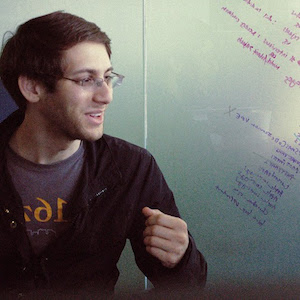
Mek Karpeles
Internet Archive
 Mek Karpeles
Internet Archive
Archive Labs: Experiments in Decentralization.
In four short minutes, we'll survey a variety of efforts and integrations the Internet Archive community has implemented in order to bootstrap the decentralized web movement.
https://archivelab.org
Mek (@mekarpeles on GitHub) is a software engineer and citizen of the world dedicated to curating a living map of the universe's knowledge. His philosophies on open access and semantic knowledge systems can be explored at https://michaelkarpeles.com
|
Archive Labs: Experiments in Decentralization.
In four short minutes, we'll survey a variety of efforts and...
|
Workshops

Jehan Tremback
Althea
 Jehan Tremback
Althea
Jehan Tremback is developing Althea, a set of protocols allowing routers on a mesh network to pay each other for bandwidth. This will eliminate the role of centralized ISPs, and lower costs for bandwidth by allowing the network to grow in an organic and decentralized way. Users will load up their devices with cryptocurrency to pay for bandwidth, or install networking equipment on their property to build the network and make some money.
altheamesh.com
Jehan Tremback has been developing blockchain applications for 3 years, starting with a Dogecoin tipbot. He is currently exploring the intersection between blockchains and mesh networks.
|
Jehan Tremback is developing Althea, a set of protocols allowing routers on a mesh network to pay each other for...
|

Feross Aboukhadijeh
WebTorrent
 Feross Aboukhadijeh
WebTorrent
Deeper dive into WebTorrent.
Workshop attendees will learn how to use WebTorrent to add P2P file transfer capabilities to their websites and apps by using the open source WebTorrent library. WebTorrent is free software, MIT licensed, and 100% non-commercial. It's a great way to send files across the web and across all platforms: desktop, mobile, web, server, CLI, etc.
https://webtorrent.io
Feross is building WebTorrent (webtorrent.io), the first torrent client that works on the web (in the browser. He is bringing P2P to the masses with accessible, WebRTC-based P2P protocols.
|
Deeper dive into WebTorrent.
Workshop attendees will learn how to use WebTorrent to add P2P file transfer capabilities...
|

Joel Dietz
Decentralized Autonomous Society
 Joel Dietz
Decentralized Autonomous Society
Investigate what is possible in the realm of Decentralized Autonomous Organizations. How can they be used to protect public goods? To protect individual freedoms? To allow distributed interests to protect themselves? To allow new types of economic incentives? Joel Dietz answers all of these questions and more.
Co-founder of the Decentralized Autonomous Society, EtherCasts, and Swarm, Joel Dietz has been one of the earliest members of the Bay Area Ethereum community and greatest pioneers in the realm of decentralized govenrance. The Decentralized Autonomous Society is a distributed thinktank that also has regular meetups in Palo Alto. It has the broad goal of facilitating new types of governance that are made possible via decentralized technologies. It was founded in the early days of Ethereum.
|
Investigate what is possible in the realm of Decentralized Autonomous Organizations. How can they be used to protect...
|

David Dias
Protocol Labs/IPFS
 David Dias
Protocol Labs/IPFS
libp2p is a modular network stack designed to overcome the networking challenges faced by peer-to-peer applications. libp2p is the networking library of IPFS. Many other projects have come together to collaborate on libp2p, as it solves difficult networking challenges for everyone, and creates interoperable protocols.
Our goal at the Decentralized Web Summit is to increase the collaboration between all these peer-to-peer, distributed protocols. libp2p is a fantastic vector for collaboration.
Come build a new p2p app with us!
This workshop will cover:
- libp2p motivation and introduction
- libp2p design and interfaces
- transports
- connectivity (NAT traversal, routing)
- peer discovery
- peer routing
- content routing
- content storage
- pub / sub
- consensus
- examples of libp2p modules
- examples of using libp2p to build p2p protocols
- discuss how libp2p is used by ipfs
https://github.com/ipfs/specs/blob/master/libp2p/
David is a Peer-to-Peer Software Engineer at Protocol Labs. He is building the InterPlanetary File System, which enables the creation of completely distributed applications. He has also contributed to nodesecurity.io and built several modules that enable developers to check for vulnerabilities. He has a Master of Science in Engineering with major in Peer-to-Peer Networks from Technical University of Lisbon.
|
libp2p is a modular network stack designed to overcome the networking challenges faced by peer-to-peer applications....
|

Jeremy Rand
Namecoin
 Jeremy Rand
Namecoin
This workshop will cover how to use Namecoin, including use cases such as registering domain names and attaching an IP address to them, viewing Namecoin websites, registering Namecoin identities, attaching your public keys to your Namecoin identity, and using your Namecoin identity to send messages and log into websites. If we have time, we might also cover buying and selling domain names and identities without counterparty fraud risk.
www.namecoin.org
Jeremy is Lead Application Engineer and Community Organizer of Namecoin, a naming system (currently used for DNS and identities) which backs authenticity of records with the same algorithms and code used to back financial transactions in Bitcoin. Jeremy wears many hats at Namecoin but spends much of his time working on applications which enhance online privacy.
|
This workshop will cover how to use Namecoin, including use cases such as registering domain names and attaching an IP...
|
| access_time | 5:00-8:00 p.m. |
Reception in the Foyer